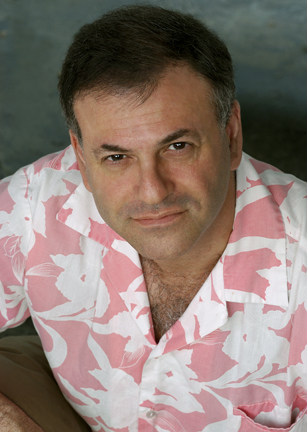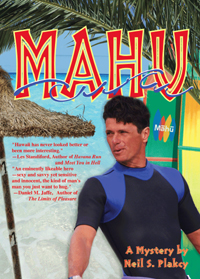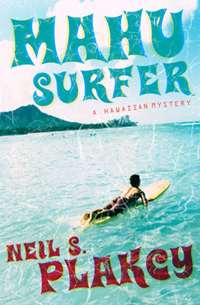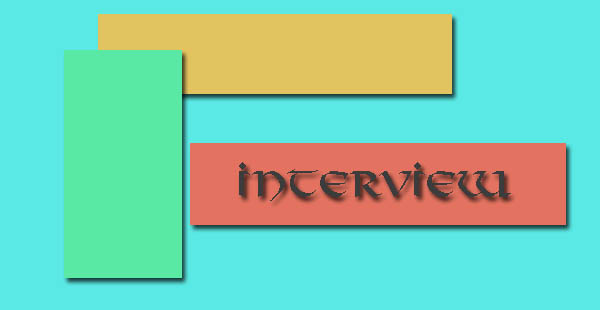NEIL PLAKCY 
Neil is the author of the Kimo Kanapa'aka mysteries Mahu and Mahu Surfer, with more on the way. Kanapa'aka is a Honolulu homicide detective who, like all good detectives, manages to find himself in some interesting and exciting situations. But Kimo is a hero with a past and a lot of inner struggles; his character is full and rich which makes the Mahu series alive and involving. With the tropical backdrop what more could you ask? I had the pleasure of meeting Neil in New York when he was one of the featured speakers on a panel of gay mystery writers and, as you might expect, he is gracious, personable, and interesting. He is devoted to what he does and, more than that, enjoys it. So, let's hear what he has to say about mysteries and writing and more. What is your approach to writing a novel: that is, do you outline or not? Do you keep files and piles of notes?
I think of books in thirds, with a plot point 1/3 and then 2/3 of the way along. I start with a vague idea of the first plot point – in MAHU SURFER it's another murder—and work my way toward that point. I have to stop a lot and say “What else can be happening?”
I usually keep a computer file with lots of notes and ideas, and often use that as a way of brainstorming my way through problems.
I don't outline, because for me writing is the process of telling myself the story.
What are some of the tricks, pitfalls, etc. that you need to keep in mind when writing a mystery novel/story?
A pitfall for me is that I often have people give up information too easily. I have to go back over those scenes and make it more difficult for Kimo to get the information he needs. I rush through, figuring out what's supposed to be happening in the scenes, and then go back later to add tension and draw things out a bit.
I also tend to focus on plot in my first draft, and then as soon as I finish that first draft I go back to the beginning and start revising, adding in layers of character development and description. 
What is it that kick starts a project for you: a character, a situation, or…?
I generally begin with an idea—for example, with MAHU SURFER, I wanted Kimo to go undercover, so that as soon as he started telling the truth about his life, he'd have new secrets to keep.
What started you in writing? What kept you going?
I began writing as a way to work through any personal issues I had. It was very satisfying to impose a sense of order on the world. Why did this happen? Well, I'll figure it out and write out everything so that it all makes sense. I kept going because the process was so rewarding. It took me a long time to realize that I was more of a genre writer than a literary writer—I was more interested in telling stories than I was in playing with language. Since the bulk of college and workshop writing is focused on literature, it wasn't until I began taking MFA classes at Florida International University in Miami that I found people who valued mystery and other genre writing and were willing to teach students how to do it. Getting the reinforcement from the faculty at FIU was really crucial to my persevering until
Can you tell us a bit about the first story you had published -- how did that come about? And how do you feel about it now?
In the early 1980s I attended a writing workshop at Long Island University's Southampton campus. For two weeks, Russell Banks led us through writing exercises. One of those was “Imagine a place you'd never go—and what would make you go there.”
I was (and still am) a big Hemingway fan, and there was at the time a biker bar in the Florida Keys that was reputed to have been where parts of “To Have and Have Not” were filmed. I wanted to go there—but knew I never would because it would probably be too dangerous. So I created a situation where a character had to go there.
The story that resulted, called “My Cousin's Keeper,” won a contest sponsored by South Florida magazine (now defunct) for the best new short story set in South Florida. I still like it; I can see that I was beginning to develop my voice there.
How have you grown as a writer? What has gotten better? What things have you dropped along the way?
I'm much more comfortable with my narrative voice now. It comes to me much more easily. I think I can also spot plot problems much more quickly. Instead of writing a whole book (or much of one) and then realizing it had fatal flaws, I can diagnose and fix those flaws before they get too problematic.
What are the three most important pieces of advice you'd give to writers?
Read. Write what you like to read. Persist in the face of rejection. If you love to read mysteries and aren't particularly fond of “literary” novels—don't try to write a “literary” novel. And if you don't like mysteries, or look down on them, don't try to write one.
How long does it generally take you to complete a novel – from conception to completion?
When I'm on a roll, I can write 5-10 pages a day (usually about five.) So that means I can write the very rough first draft of a book in 2-3 months, depending on whether I'm able to work every day (summer and vacations) or just a few days out of the week. Often an idea will percolate for a long time, though, until I'm ready to write it. I've been thinking about the fourth book in the MAHU series for a year or so and haven't quite gotten it to the point where I'm ready to start writing. How many revisions do you normally go through when writing a novel?
I do a first revision right after I finish the rough draft. I fix the plot holes, and layer in the character and the description. Then I put the book aside for several months. I go back and do a second revision where I see all kinds of problems I missed the first time around. Then I'm ready to start showing parts of the book to other readers & writers. In the third draft I fix problems they've found. Sometimes I go to a fourth draft if there's something major to adjust.

What's the most difficult stage in the writing for you?
What's most difficult is when I know there's a problem but I don't know how to fix it. That's very frustrating. I'd done three drafts of a non-Kimo mystery and sent it to my agent, who felt that the main character wasn't exciting enough. I could see that—but couldn't figure out how to fix him for quite a while.
Who are the authors that you admire most, who inspire you, whose writing you think is most beautiful, moving, exciting?
I have three literary role models—but the reason I like them is because of the way that they all integrated their life and their writing. They are Ernest Hemingway, Jack Kerouac and Jimmy Buffett. Hemingway's an amazing stylist, but sometimes his work sounds stilted today. Neither Kerouac nor Buffett are great wordsmiths, but they keep you turning the pages. I like a lot of contemporary mystery writers—Craig Johnson, Chris Grabenstein, Zoe Sharp, Lee Child, Robert Crais and Michael Connelly are among my favorites. Janet Evanovich and Suzanne Brockmann are guilty pleasures.
What do you find most satisfying in another author's book: a great plot, beautiful writing, fully realized characters?
Ideally, I'd like to see all three. I think Nancy Pickard's book “The Virgin of Small Plains” did that. And as a consequence it was a book that got passed from hand to hand. The same for Craig Johnson's books. In your own work, what do you think you are strongest at: plot, beautiful prose, character? Or something else?
From the comments I've received, I'd have to say I'm best at character development. That's what people are always complimenting me on. They're interested in Kimo's character and the emotional journey he takes. How do you plot a mystery or a thriller – what stymies you most, what do you find easiest?
I'm getting better at motive. For a long time I couldn't imagine what would drive someone to take another's life. I finally got over that hurdle. Once you establish a compelling reason why someone would commit a crime, you can start figuring out who the victims and villains are. What advice can you give on plotting a mystery?
A strategy I learned in graduate school has been very helpful. Pick a book like the one you'd like to write, and start analyzing it. How many chapters? How many pages? How many words? How much time passes in each chapter? When do the crimes occur? How much time is taken on character development, description, etc. When you start looking at books in this way, you see all kinds of stuff you don't notice as a reader. You might say, for example, “Wow! I never realized that this whole book takes place in two days! No wonder it seemed to move fast.” Or “Now I understand why this character's death had such an impact on me—I spent a hundred pages getting to know her.” Does the world you create in your non-series novels continue to live in your mind long after you've completed the novel? What implications does that have in terms of wanting to do a series in the same setting?
Any time I create a world in a book, it stays with me. I have written a number of books set in a town much like the one where I grew up, in Bucks County, PA (outside Philadelphia.) The characters and locations from one book show up in another. Why reinvent the wheel? I didn't intend MAHU to spawn a series, but I was so interested in the character and the world that I wanted to keep exploring it.
Talk about the series you are writing, what you like, how you approach it, the pitfalls.
I get very into Kimo's world. I have thought a lot about the supporting characters—his family and friends—and what their character arcs are. As I plot each new book I think about what they're doing and how that might impact the plot. The fear in doing a series is that you might get stale, writing the same book over and over again. I think by focusing on Kimo's coming out process, and how the crimes he investigates affect that process, I can avoid some of those problems.
It's certainly a big advantage to come back to characters you've already developed rather than starting from scratch. The disadvantage can be when your plot requires a character to act in a way that goes against what he or she has done in the past.
What other kinds of writing do you do?
I have written a number of mystery short stories featuring Kimo, as well as the novels. I also write gay erotica and have had stories in many anthologies. And I do a lot of book reviews as well. What tips do you have for beginning writers?
I think there are two ways you improve as a writer: by reading, and by writing. Read everything you can find in the genre in which you want to write, whether it's literary novels, mysteries, romances, etc. You'll absorb a lot from that. And then you have to write as much as possible and as regularly as possible. Writing is a muscle, and it improves the more you work it. What about readers – how have they received your books?
I haven't developed any deep relationships yet with fans, but the comment I generally get is that they liked the character development of the books. The mystery was OK, but they really enjoyed getting to know Kimo and seeing inside his head. Is the publication of each book as thrilling as that first one?
Almost. I love each of these books and am delighted to see them get published. Plus with each book I feel more and more like a real writer! What are your goals as a writer?
I just want to keep getting published. The book business is so competitive you've got to keep writing good books that people want to read. Why do you think mystery is so popular?
In difficult times, mystery is very comforting: something bad happens that puts society out of balance, and someone good or courageous takes risks to bring the villain to justice and restore the social order. Also, people like to figure out puzzles, just like solving crosswords. What sparked the idea for the Mahu novels? How long had you had this idea before starting to write?
As I said above, I got the idea to send Kimo undercover, so that he'd be keeping secrets again, just as he'd finally starting telling the truth about his life. At first, I thought it was a short story, but it kept growing. Did you feel compelled to write this book?
I did feel that it was a story I needed to explore. I'd already written what I thought was the second novel in the MAHU series, which took place six months after MAHU, but this story wanted to sandwich between those two, and I resisted it for a long time before I finally gave in and started writing. How long did it take to complete it? What was your least favorite part in the writing of the book?
My least favorite part of any project is when I have to make things tough for my characters. At first, I didn't want Kimo to have to lie to his family and friends about the undercover assignment. I thought that would be emotionally too difficult for him. Eventually I realized that the difficulty he goes through is what makes him an appealing character, and I had to do it. What do you like best about it? Which are your favorite characters and why? Which are your favorite moments in the story?
I think the villain is my favorite character (besides Kimo, of course!) because I had to think a lot about what motivated him to do the bad things he did. I wanted to make him a sympathetic and understandable character. It's also fun to see him act bad. The scenes where he antagonizes Kimo are some of my favorites, because the sparks really fly. | 






